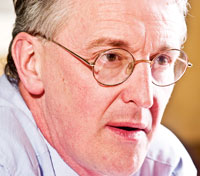Lesson to be learned from organic farmers

Conventional farmers will have to look to the skills of the organic movement if the industry is going to meet targets to produce more while cutting emissions.
Speaking at the Soil Association conference in Birmingham on Wednesday (3 February), DEFRA secretary Hilary Benn said the organic sector had learned a lot from science about how to improve yields while cutting inputs.
“The world will turn to you in the years ahead to ask how to be less dependent on oil-based fertilisers because of your knowledge and expertise,” he told delegates.
“‘Business as usual’ isn’t going to do it. Populations are growing and diets are changing and we can take for granted the way we have been doing things.
“The skill, determination and will of this movement are the skills we will need if we are going to achieve change.”
Lib Dem farm minster Roger Williams said the organic movement also had to be willing to realise it could learn from conventional farmers.
“Organic farmers and conventional farmers both need to be less defensive if we are going to learn the lessons that each system can offer,” he said.
“We need to listen to each other if we are to produce as much food as possible without destroying the world’s resources.”
Mr Williams said conventional farmers were already making efforts to cut chemical fertiliser use.
“It would be difficult to stop use of inorganic fertiliser, but everyone in conventional farming is using inputs more precisely and in a limited way,” he said.
“A move away from it can’t be immediate, but the market is driving this and people are making better use of nitrogen on their farm.”
Shadow farm minister Jim Paice said both sectors also had to maximise their use of science – which did not automatically mean looking to GM technology – to learn about how to produce more while impacting less.
“There’s a quantum leap between science and how farmers can apply it. We need to maximise scientist’s contribution and coordinate research so it can be used on-farm,” he added.

